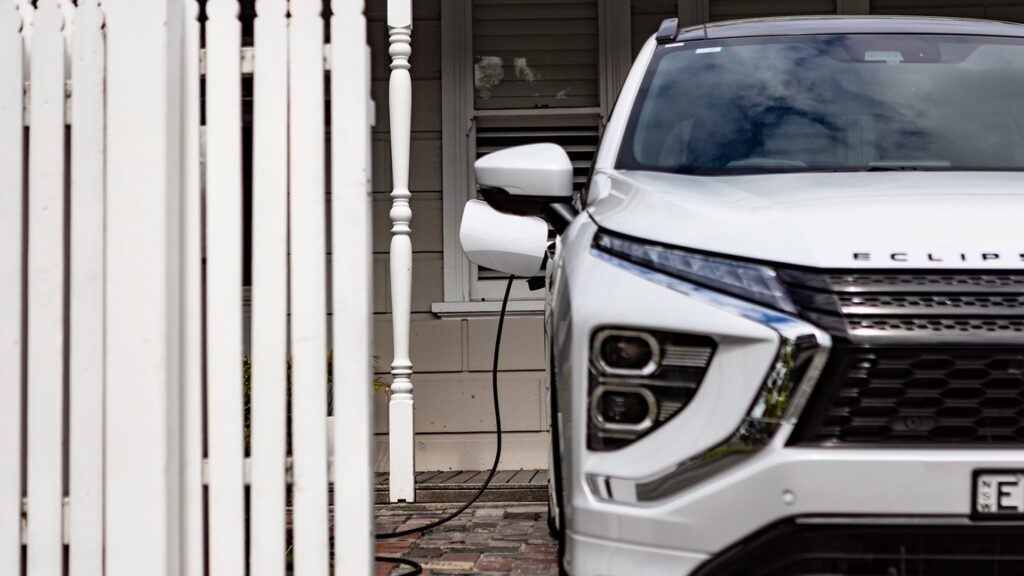Electric vehicles are making waves worldwide, with sales continuing to grow. But how efficient are EVs for your business? CCIWA Corporate Member Mitsubishi Motors debunks the most common EV myths.

Myth 1: A PHEV is not an EV
We know that definitions can be difficult. So to debunk this first myth, we need to outline exactly what an “EV” is. In this education piece, we define an EV as: "A vehicle that can be driven with zero tailpipe emissions utilising an externally charged battery to power the wheels."
It includes both:
- Battery Electric Vehicle or BEV - A vehicle that can only be powered by an electric motor that draws electricity from an externally charged battery.
- Plug-in hybrid electric vehicle or PHEV - A vehicle that can be powered by an electric motor that draws electricity from an externally charged battery and an internal combustion engine.
But, what about HEVs? (Non-plug-in hybrid EVs)
Whilst both PHEVs and BEVs are considered electric vehicles, it’s important to note that a regular hybrid (HEV’s) is not considered an ‘EV’ as outlined in this piece.
The reason for this is simple - although HEV’s offer transport emissions reduction, their batteries cannot be plugged-in and charged from an external power source, so it is not possible to achieve zero emissions driving.
You can check out further explanations into EV terms and test out your EV IQ here.
Myth 2: EVs and PHEVs are slow to charge
Charging your EV may be slower than filling up at the petrol station, but that doesn’t mean you’re waiting hours before you can drive down the road.
In fact, in terms of destination charging when at home, or at your business, the actual time it takes on your part is very small. For example, as little as 10 seconds can be all that is needed to physically plug in and connect your EV to the charging point – simply setting up and leaving your car to charge whilst you go about your normal day or activities. Again, you just need the same amount of time (~10 seconds) to unplug your EV before you get back in your car and depart.
As electric and plug-in hybrid electric vehicle technology advances, charging times are becoming shorter and shorter. For example, PHEVs take between six to 10 hours to charge from empty to full using a regular 10A power point, which can easily be accomplished overnight.
However, EV’s typically take much longer to charge up fully from empty when using a regular 10A power point. E.g. 80kWh Battery electric vehicle (BEV) takes approximately 33 hours to charge and so you would need to plan this length of time into your activities or routine. If using DC charging infrastructure, much quicker times are possible.
For faster charging, look for DC charging capability.
Myth 3: EVs and PHEVs can’t cover much distance
The distance your electric vehicle can cover with battery power all depends on the drive battery capacity. For example, the drive battery of the Eclipse Cross Plug-in Hybrid EV allows you to drive 55km before the petrol electric hybrid system is required. With Australians driving an average distance of 33.2km per day in 2019-20, it’s easy to see how this is more than enough for your everyday journeys.
If you are planning a longer trip, PHEVs give you the flexibility of filling up on petrol so you can make the distance.
Myth 4: EVs and PHEVs are extremely expensive
While electric vehicles do currently cost more than petrol cars, new Federal Government policies aim to lower that price. The Federal Government's electric car discount exempts many electric cars from import tariffs and fringe-benefits taxes, reducing their cost.
On top of this, running costs for EVs and PHEVs can be considerably lower than petrol cars. In fact, the Electric Vehicle Council estimated that electric vehicles can save you around $1500 for every 15,000km you drive. This difference is only likely to become more so over time as petrol costs continue to rise.
Myth 5: There is nowhere to charge electric vehicles away from home or the office
Currently there are more than 2000 public electric vehicle chargers installed across Australia, and this number only continues to increase.
The New Federal Government policy seeks to increase the number of charging stations across the country. States are also leading the way in EV policy, and rolling out new public charging points.
Find out more information on Mitsubishi’s range of EVs here.












